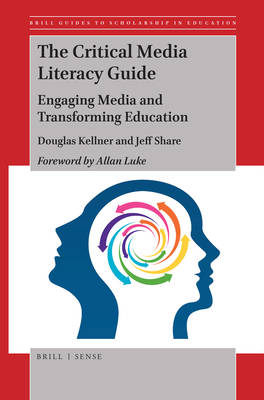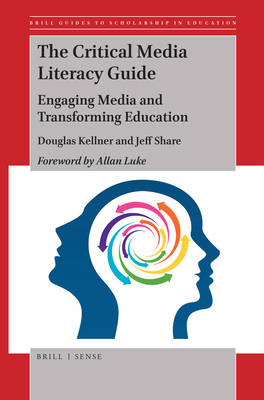
- Retrait gratuit dans votre magasin Club
- 7.000.000 titres dans notre catalogue
- Payer en toute sécurité
- Toujours un magasin près de chez vous
- Retrait gratuit dans votre magasin Club
- 7.000.0000 titres dans notre catalogue
- Payer en toute sécurité
- Toujours un magasin près de chez vous
The Critical Media Literacy Guide
Engaging Media and Transforming Education
Douglas Kellner, Jeff Share
53,45 €
+ 106 points
Format
Description
Over half the world's population is now online, interconnected through a globally-networked media and consumer society. The convergence of information, media, and technology has created the predominant ecosystem of our time. Yet, most educational institutions are still teaching what and how they have for centuries, and are thus increasingly out-of-date and out-of-touch with our current needs. The Critical Media Literacy Guide: Engaging Media and Transforming Education provides a theoretical framework and practical applications for educators and teacher education programs to transform education by putting critical media literacy into action in classrooms with students from kindergarten to university. Douglas Kellner and Jeff Share lay out the evolution of thinking and development of media and cultural studies, from the Frankfurt School to current intersectional theories about information and power that highlight the importance of race, gender, class, and sexuality. They provide insightful and accessible entry into theorizing education and information communication technologies through linking the politics of representation with critical pedagogy.
The increase in fake news, alternative facts, bots, and trolls, challenge our abilities to judge credibility and recognize bias. Kellner and Share present a critical lens and strategies to contextualize and analyze the dominant ideologies going viral across social media platforms and disseminated globally from enormous transnational corporations. The Critical Media Literacy Guide is a powerful resource to analyze and challenge representations and narratives of multiple forms of identity, privilege, and oppression. Since the struggle for social justice and democracy require new theories and pedagogies to maneuverer the constantly changing terrain, this book is essential for all educators.
The increase in fake news, alternative facts, bots, and trolls, challenge our abilities to judge credibility and recognize bias. Kellner and Share present a critical lens and strategies to contextualize and analyze the dominant ideologies going viral across social media platforms and disseminated globally from enormous transnational corporations. The Critical Media Literacy Guide is a powerful resource to analyze and challenge representations and narratives of multiple forms of identity, privilege, and oppression. Since the struggle for social justice and democracy require new theories and pedagogies to maneuverer the constantly changing terrain, this book is essential for all educators.
Spécifications
Parties prenantes
- Auteur(s) :
- Editeur:
Contenu
- Nombre de pages :
- 144
- Langue:
- Anglais
- Collection :
- Tome:
- n° 2
Caractéristiques
- EAN:
- 9789004404526
- Date de parution :
- 09-05-19
- Format:
- Livre broché
- Format numérique:
- Trade paperback (VS)
- Dimensions :
- 152 mm x 231 mm
- Poids :
- 204 g

Les avis
Nous publions uniquement les avis qui respectent les conditions requises. Consultez nos conditions pour les avis.






